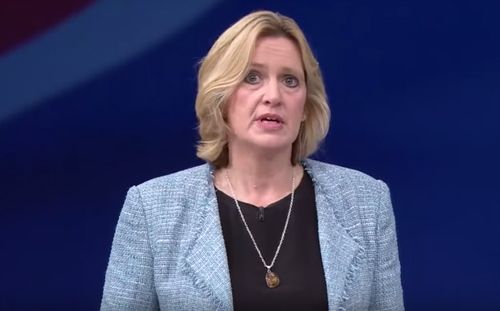

Amber Rudd has claimed the Government “must be tough on subsidies” in her first speech as secretary of state for energy and climate change at the Conservative Party conference.
Speaking on Monday (October 5) in Manchester, Ms. Rudd took to the stage as the first Conservative to hold the position in more than 20 years and claimed that despite the numerous green policy changes to have been implemented since May, she is “a proud green Conservative, on the side of the consumer.”
She said: “Our changes to low carbon subsidies since the election are motivated by getting the balance right between supporting new, low carbon generation and protecting billpayers.
“We are clear that moving to a low carbon economy is key to our long-term economic and environmental prosperity. But I am also clear this must be done in the most cost-effective way possible. While people support a transition to a low-carbon future, they don’t support this at any cost. There is no magic money tree. As we have already shown, we will be tough on subsidies.”
Since winning a slim majority in May’s General Election, the Conservative Government has cut subsidies to small scale solar projects and onshore wind farms; closed the Green Deal; scrapped the Allowable Solutions carbon offsetting scheme and cancelled the proposed 2016 increase in on-site energy efficiency standards for new homes.
According to Ms. Rudd, “a root and branch review” of energy policies has been undertaken at the Department of Energy and Climate Change (DECC) with the aim of establishing an energy policy “driven by the people who pay the bills.”
DECC’s ongoing consultation on cuts to the solar Feed-in Tariff was also raised in the speech following sustained pressure from the solar industry to review the Government’s proposed approach, which would see funding cut but around 87% by January 2016.
Ms. Rudd said: “We have solar panels on three quarters of a million roofs. With solar costs continuing to fall and new innovations in battery storage, renewable energy can stand on its own two feet.”
Despite the energy secretary’s claims of being committed to the green agenda, the Conservative Party’s policies have come under fire throughout the current party political conference season. Speaking for the first time as leader at the Liberal Democrat conference on September 23, Tim Farron referred to the changes specifically and said: “[It has been] difficult if you run a solar energy firm as your staff face unemployment because Mr. Cameron decided to ditch the ‘green crap’.”
Labour’s shadow secretary for business, innovation and skills Angela Eagle followed suit, claiming the Government was “abandoning this country’s leadership on the green economy, putting billions in potential future export earnings at risk.”
She added: “This Government has slashed support for the solar power sector and onshore wind at the same time as scrapping the Green Deal. This makes absolutely no sense.”
Shadow energy secretary Lisa Nandy said in her speech at the Labour conference that the Government’s energy policy was a “national scandal”, claiming the Conservatives had “pulled the rug out from under the British solar industry just at the moment that solar power is on the cusp of offering cheap, subsidy-free energy.”
Amber Rudd hit back at the Labour party in her speech, claiming the opposition’s energy policy was “riven with gimmickry” and was “anti-consumer, anti-business, anti-taxpayer.”
Ms. Rudd also used her speech to reiterate the Government’s commitment to insulate a million more homes over the next five years.



